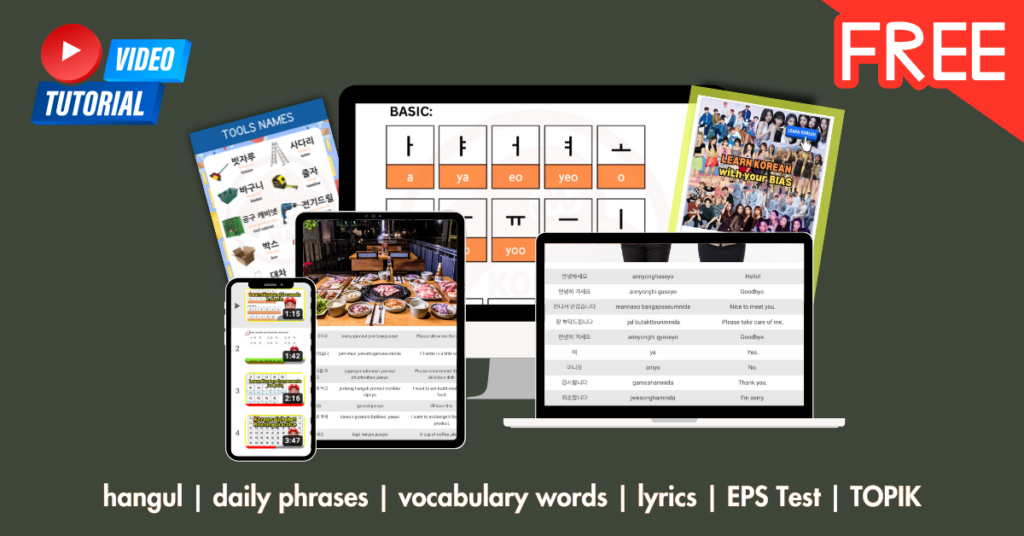-(으)니까 expresses the reason or cause for something and corresponds to ‘since’ or ‘because’ in English.

You might already be familiar with the ‘어서/아서‘ grammar pattern which is used to express the same thing. Please note that there are some important differences between the two so please take not and make sure you finish reading this blog.
The conjugation rules are:
- If there is no 받침 or if the stem ends with a ㄹ 받침 – A / V +니까 is used.
- If there is a 받침 at the end of the A/V stem – A / V + 으니까 is used.
to buy 사다 → 사니까 Since I buy
to see 보다 → 보니까 Since I saw
to come 오다 → 오니까 Since you’re here/come
to live 살다 → 사니까 Because I live
to be painful 아프다 → 아프니까 Becase it’s painful
to be big 크다 → 크니까 Because it’s big
to have 있다 → 있으니까 because I have
to not have 없다 → 없으니까 because I do not have
to read 읽다 → 읽으니까 Because I read
to eat 먹다 → 먹으니까 Because I read
to listen 듣다 → 들으니까 Because I listen
to be hot 덥다 → 더우니까 Because it’s hot
Learn more daily content on Instagram!
A: 마리오 씨, 오늘 카페에 갈까요? Mario, shall we go to the cafe today?
B: 오늘 배가 좀 아프니까 다음에 가요. My stomach hurts a little today, so let’s go next time.
A: 시간이 없으니까 취소할까요? We don’t have time, so should we cancel it?
B: 네, 취소하세요. Yes, please cancel it.
A: 오후에 눈이 오니까 우산을 챙기세요. It’s snowing in the afternoon, so bring an umbrella
B: 네, 고마워요. Sure, thank you.
A: 화장실이 어디입니까? Where is the restroom?
B: 저는 잘 모르니까 경비한테 물어보세요. I don’t know well, so ask the security.
(으)니까 can also combine with the past tense marker to describe a past event or state.
Table of Contents
Past Tense A/V-았/었/했으니까
to buy 사다 → 사니까 Since I buy it → 샀으니까 Since I bought it
to see 보다 → 보니까 Since I see → 봤으니까 Since I saw it
to come 오다 → 오니까 Since you’re here/come → 왔으니까 Since you came
to live 살다 → 사니까 Because I live → 살았으니까 Because you lived
to be painful 아프다 → 아프니까 Because it’s painful → 아팠으니까 Because it was painful
to be big 크다 → 크니까 Because it’s big → 컸으니까 Because it was big
to have 있다 → 있으니까 Because I have → 있었으니까 Because I had
to not have 없다 → 없으니까 Because I do not have → 없었으니까 Because I did not have
to read 읽다 → 읽으니까 Because I read → 읽었으니까 Because I had
to eat 먹다 → 먹으니까 Because I eat → 먹었으니까 Because I ate
to listen 듣다 → 들으니까 Because I listen → 들었으니까 Because I listened
to be hot 덥다 → 더우니까 Because it’s hot → 더웠으니까 Because it was hot
한국에서 살았으니까 한국어를 잘해요. I live in Korea, so I speak Korean well.
아침에 늦게 왔으니까 늦게 퇴근할게요. I came late in the morning, so I’ll leave work late.
Examples
- 비가 오니까 우산을 가져가세요. (Because it’s raining, please take an umbrella.)
- 밥을 먹었으니까 지금 산책을 해봐요. (Since you’ve eaten, why don’t you take a walk now?)
- 시간이 늦었으니까 집으로 돌아가야 해요. (Since it’s late, we should go back home.)
- 커피를 마셨으니까 더 잠이 안 올 거예요. (Since you drank coffee, you probably won’t be able to sleep more.)
- 문이 잠겼으니까 다른 출구로 나가야 해요. (Since the door is locked, we have to exit through another door.)
- 너무 추우니까 따뜻한 옷을 입어야 해요. (Because it’s too cold, you should wear warm clothes.)
- 잘 먹었으니까 간식은 필요 없어요. (Since you ate well, you don’t need snacks.)
- 시험이 있으니까 공부를 해야 해요. (Because there’s an exam, you have to study.)
- 운전이 길어서 피곤하니까 조금 쉬어요. (Because the drive was long and tiring, take a rest for a while.)
- 바쁘니까 내일로 미루는 게 어때요? (Because we’re busy, how about postponing it until tomorrow?)
- 계산이 많으니까 좀 기다려 주세요. (Because there are many calculations, please wait a moment.)
- 사람이 많으니까 좁은 길을 피하세요. (Because there are many people, avoid narrow paths.)
- 어제 축구를 해서 다리가 아파요. (으)니까 운동을 쉬었어요. (Because I played soccer yesterday and my legs hurt, I took a break from exercising.)
- 시간이 없으니까 빨리 결정해야 해요. (Because there’s no time, we need to decide quickly.)
- 친구가 일찍 왔으니까 바로 문을 열어줬어요. (Because my friend arrived early, I opened the door right away.)
- 비가 오니까 공원에 나가기는 좀 그래요. (Because it’s raining, going to the park doesn’t seem like a good idea.)
- 오늘 바쁘니까 내일 다시 연락해주세요. (Because I’m busy today, please contact me again tomorrow.)
- 학교가 끝났으니까 놀러 가도 돼요. (Since school is over, you can go out and have fun.)
- 지하철이 막혀서 택시를 탔으니까 좀 늦었어요. (Because the subway was closed, I took a taxi and I’m a bit late.)
- 날씨가 좋으니까 밖에 나가서 산책하고 싶어요. (Because the weather is nice, I want to go out for a walk.)
Difference Between -아/어서 and -(으)니까
아/어서
1. Cannot be used in instructions or recommendations sentences.
– 날씨가 더워서 택시를 탈까요? (x)
– 시간이 있어서 기다려 주세요. (o)
2. Tense markers such as 았/었/겠 cannot be used.
– 아침에 늦게 왔어서 늦게 퇴근할게요. (x)
3. Used mainly to express a general reason.
A: 모임에 왜 안 갔어요? Why didn’t you go to the gathering?
B: 바빠서 안 갔어요. I was busy so I did not go.
4. Can be used with common words of greeting, such as 반갑다, 고맙다, 감사하다, 미안하다.
– 도와주셔서 고마워요. (o)
-(으)니까
1. Can be used in instructions or recommendations sentences.
– 날씨가 더우니까 택시를 탈까요? (o)
-시간이 있으니까 기다려 주세요. (o)
2. Tense markers such as 았/었/겠 can be used.
– 아침에 늦게 왔으니까 늦게 퇴근할게요. (o)
3. Used when stating a subjective reason or providing a basis for a particular reason. It is mainly used when the other party also knows about the topic under discussion.
A: 모임에 왜 안 갔어요? Why didn’t you go to the gathering?
B: 바쁘니까 안 갔어요. I was busy (as you know) so I did not go.
4. Cannot be used with common words of greetings.
– 도와주니까 고마워요. (x)
Learn Korean With More Blogs

- EPS Free Course
- Learn with BTS
- Numbers and Words
- Travel and Daily Korean
- TOPIK
- Hangul – The Korean Alphabets
- Beginner Grammar
- Intermediate Grammar
- Tools Names

